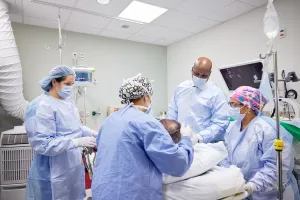Gastrointestinal cancer affects one or many organs in the digestive system, like the anus, colon, esophagus, gallbladder, liver, pancreas, rectum, small intestine and stomach. While gastrointestinal cancers won't often show symptoms until the cancer has advanced, we can get one step ahead of your health by screening for cancers before symptoms even surface.
Our team-based approach to gastrointestinal cancer care
Did you know the average gastrointestinal (GI) tract is about 30 feet long? And because your GI tract is so long, gastrointestinal cancer can affect your body in different ways. From surgery to medical oncology, to genetics, gastroenterology and interventional radiology, we’ll support you every step of the way on your treatment path.
First, we’ll test for any signs of gastrointestinal cancer or even use screening methods to look for signs of gastrointestinal cancer. Next, we’ll work with you to pick the best course of treatment — like hyperthermic intraperitoneal chemotherapy (HIPEC) or cutting-edge clinical trials — for you, your health and your lifestyle.

Conditions
Tumors can grow on any organ in the digestive system, leading to gastrointestinal cancers like:
Testing
Like every person, every instance of gastrointestinal cancer is unique. That’s why it’s important to get screened early and often, as these types of cancers are mostly asymptomatic until the cancer reaches a later stage and spreads to other parts of the body.
At Tufts Medicine, you’ll have a team of experts who can cover every aspect of your health. Screening for colon cancer starts at age 45 for all people, and can start earlier if there are family or genetic risk factors.
Screening methods like a colonoscopy or certain types of home kits that test your stool help us detect cancers of the lower GI tract, while an endoscopy screens for issues related to the upper GI tract. We can further understand your health using imaging studies and blood testing.
Treatments
Your body, your health history and your lifestyle are unique to you. Your gastrointestinal cancer treatment path will be, too. We’ll work with you and your family to find the right combination of traditional and novel therapies that best meet your needs.
Tried-and-true treatments for gastrointestinal cancer include:
- Chemotherapy
- Minimally invasive surgery (e.g., laparoscopy, robotic surgery, transanal endoscopic microsurgery)
- Radiation therapy
- Traditional surgery
We’re also one of the few health systems to offer hyperthermic intraperitoneal chemotherapy (HIPEC), which targets cancer that has spread to the lining of your abdomen. During the HIPEC procedure, our surgeons will remove all visible tumors and circulate heated chemotherapy agents throughout your abdominal cavity.
In addition to HIPEC, we offer cutting-edge new therapies through national clinical trials and Tufts Medicine-led research.

From regular office visits to inpatient stays, find the healthcare you need and deserve close to home.

Meet the doctors and care team devoted to supporting you every step of the way along your path to better health.